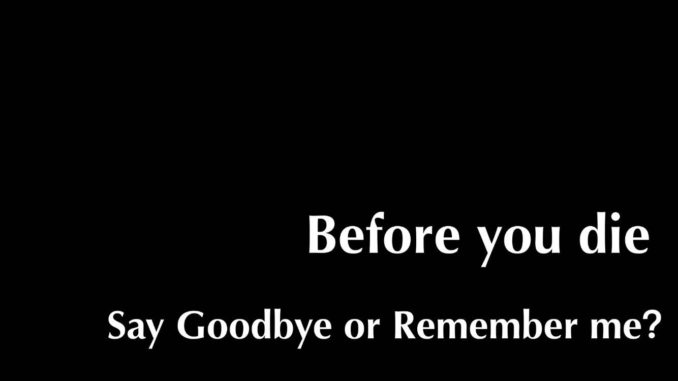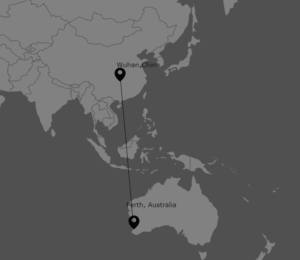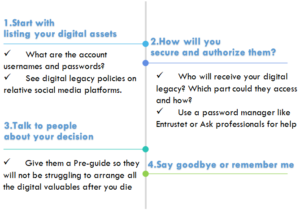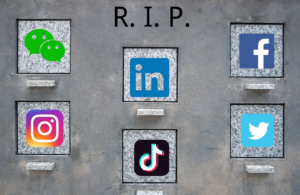
At 2 a.m., barefoot Amy sat at the floor, with her arms wrapped knees, near the sofa in the living room. Her tearful face was illuminated by the light from the screen of her phone, a video posted by her dead mother on Weibo has been played over and over again. She mourns her mother trough these digital memories. After all, people physically die, but they could live forever on the Internet.
Amy’s mother has tested positive for coronavirus in early March and passed away in Wuhan in 20 days. She, a Chinese-Australian, was in Perth when she was told the news, the outbreak makes the usual ten-hour flight to hometown looks “reachless”.

Her mother has made a will during her illness, planing the money, the house, and the stock. But that is far from enough when Amy’s brother tried to unlock their mother’s phone, logged in WeChat to announce the sad news to kith and kin. Neither of them has inherited any digital information. She realized that her mother, like millions of people around the world, has never considered the digital legacy.
Online ghost in the digital era
“I will contact Tencent (the company who developed Wechat), hoping to find the password and transfer the money from her account, but I don’t know will her WeChat and other social media account be removed since its binding phone number has been canceled after death,” said Amy.
Like Amy’s mother, many owners of those social media accounts have passed away. An academic analysis in 2019 shows that by 2050, Facebook will have more dead users than living ones, and the number of dead people on Facebook is predicted to reach 4.9 billion by 2100.
You never know tomorrow and accident, which comes first.
In January, a helicopter crash killed the basketball star Kobe Bryant, this is his last post on Facebook. Except for countless constantly updated comments left by fans to memorize him, his account is normal as every day before, there is no word “Remembering” showing next to his name on the profile. But Facebook actually provides a “memorialized accounts” policy from 2009 for friends and family to gather here and share memories for the deceased.
“Technology companies, in fact, are caught between a rock and a hard place. When people are alive, a great deal of data is created by them, companies like Facebook save the likes, comments, or any other digital footprint. When users die, companies seem to have no proper reason to keep such huge data for us. It takes money,” said Mr. Morgan, a professional lawyer who works in Sydney.
What is happening around digital death?
Back to the year 2003, UNESCO published the charter on the preservation of digital heritage and defined that digital heritage includes personal texts, databases, still and moving images, audio, graphics, software, and web pages.
“However, people lack awareness of how to protect these or how to deal with digital assets, clients sometimes come to say that they cannot access to their dead parents’ PayPal or Amazon, or unable to inherit online books or any other products or services which have been purchased”, said Mr. Morgan, “If all of these could be planned earlier, things would be easier.”
In fact, organizations that provide “digital legacy” services are available now worldwide. They help customers keep usernames and passwords to ensure that their loved ones or appointed person gain their digital inheritance according to their will.
An American company Entrustet offers secure online services that help people organize and prepare last wishes for digital assets. Your digital legacy produced by ACCAN and the University of Melbourne gives customers advice on what they need to consider before death and Australia’s national independent regulator eSafetyCommissioner lists several links to some companies’ policies on how users can set the post-death status of their accounts.
“A normal step is to leave some words in your will, remember, digital assets are even more complicated than physical assets since they may include social media accounts, online banking accounts, blogs, emails, and other online properties or records,” said Mr. Morgan, ” what’s more, you cannot totally count on companies, even if Facebook or Twitter can be financially successful forever, they could revise their terms or policies in any time.”

Farewell or immortality? Plan ahead
One example to prove Mr. Morgan’s word is Twitter. In November 2019, Twitter decided to remove inactive accounts that have not been logged in for six months. People are frustrated because many of Twitter’s “inactive” users had died, and the account removal process means the accounts belonging to the deceased will be cleaned.
“I cannot imagine that my mother’s account to disappear one day, I know I can take screenshots of every post from her now. But it’s different, even if there will never have updates from my mother, but the existence of account itself is really important to me,” said Amy.
Later, Twitter halted its plan and said no account will be deleted until it finds a way to memorize the “dead” accounts. However, Mr. Morgan also pointed out that if the account of the dead person cannot be managed well, it could result in privacy breaches, identity theft and may be attacked by hackers.

“This is indeed a practical problem that you should consider earlier, who could have access to our digital world? Leave their names before you die. Your cybercurrency may be key to your family’s ongoing finance. How do you handle emails and files that you need to keep private and which ones can be opened to your family? What about those photos on cloud storage? You know, for people who just lost their loved ones, the belongings bring comfort and cheers them up,” said Mr. Morgan.
According to a survey by YouGov, 2019, 7% of Britain want their social media profiles to live online forever, 26% choose to take offline their accounts but pass the content to relatives, friends and loved ones, 25% will delete everything and then take their passwords to the grave.
No matter which option you would like to decide: say farewell or immortality. Think about it from this moment and tell me your idea.
If you are interested in the past news which I mentioned in the video, click News1, News2, and you can see the story here.




Be the first to comment